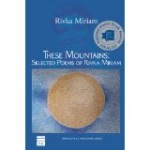 If you love modern Hebrew poetry, the book These Mountains: Selected Poems of Rivka Miriam (The Toby Press, 2009), translated and with an introduction by Linda Stern Zisquit, must be a part of your collection. This volume is the first time that a book-length translation of the poet’s work appears in English. As such, this new book makes an important contribution to contemporary Hebrew poetry available in English. Readers should be especially grateful that the publisher, Toby Press, continues to publish volumes of translated poetry that contain both the original Hebrew and the English side-by-side. This dual-language presentation adds depth even for those with only minimal Hebrew skills.
If you love modern Hebrew poetry, the book These Mountains: Selected Poems of Rivka Miriam (The Toby Press, 2009), translated and with an introduction by Linda Stern Zisquit, must be a part of your collection. This volume is the first time that a book-length translation of the poet’s work appears in English. As such, this new book makes an important contribution to contemporary Hebrew poetry available in English. Readers should be especially grateful that the publisher, Toby Press, continues to publish volumes of translated poetry that contain both the original Hebrew and the English side-by-side. This dual-language presentation adds depth even for those with only minimal Hebrew skills.
Rivka Miriam, born in Israel in 1952, is a child of Holocaust survivors who became a published poet at the age of fourteen. Her earliest poems were inspired by what she had learned about the Holocaust and her family’s experience. She is similarly influenced by Jewish texts and religious and theological ideas, some of which seeps into and infuses the poetry.
Rivka Miriam’s poems are deceptively simple at times. The language is straightforward, yet worlds are contained within it. Some lines come directly from Biblical or liturgical texts, while others could be everyday speech.
Biblical characters are featured in many poems, as in “The Stripes in Joseph’s Coat” which employs an economy of language to paint a rich history of Joseph’s whole ancestry. “The Song to Jacob who Moved the Stone from the Mouth of the Well” is a powerful, moving interpretation of the relationship between Jacob and Leah, told from Leah’s perspective, which contains the lines, “Flocks of sheep hummed beneath our blankets,/ tent-flies were pulled to the wind,” and ends with the lines, “And he didn’t know I was Leah/And flocks of sons broke through my womb to his hands.” This poem functions as modern midrash, which gives Leah a voice and adds a perspective missing from the Biblical text. God, too, appears frequently in the poems, an intimate presence with whom the poet is in relationship, as in “Still,” in which God knocks on the window and enters the room.
Many of the poems use maternal imagery such as breasts and nursing, as in “I Nurse a Very Old Woman,” or “Oh My Mother.” Sometimes these images are comforting and nurturing, but they can also be quite disturbing, as in the images of children suckling ash and leaves in “Never Will I Be Like the Mother in the Picture” or fire asking to be nursed in “The Fire, Blushing from Fear.”
The land of Israel is also a common theme in Miriam’s poetry. She writes of a mystical connection to the land, markedly different from so many of her Israeli peers who respond with irony when exploring a connection to the land. Hers is an unironic relationship, one that is deeply physical and sensual. The land in her poetry is a living being, a friend and sometimes a lover. In “These Mountains” the mountains sit in armchairs and eat cake like comfortable visitors while in “Lest it Be Revealed” in which “Only when my land is asleep/spread out before me/I whisper whisper her name/and she moans.”
There are references in this poetry to the pain and trauma of the Holocaust that Miriam’s family experienced. The two related poems “Chaya’s Unborn Child” and “And Shalom, Chaya’s Husband” speak of violence and loss with poignancy while avoiding any hint of sentimentality. These poems are disquieting, disturbing. There is a sense that the poet cannot help but bring forth what her legacy has bequeathed her, and that she is continually trying, over and over, to make sense of her family history of European suffering and the struggle of modern Israel.
Linda Zisquit has done a masterful job in these translations. She manages to convey both the directness and the richness of the Hebrew, while making the poems read as if they were always meant to be read in English. I can only hope that Miriam and Zisquit will continue to collaborate for years to come, and bring forth many more such volumes of achingly beautiful poetry. This volume includes an interview with Rivka Miriam, notes, and a translator’s note. Go, fast, order it now!
